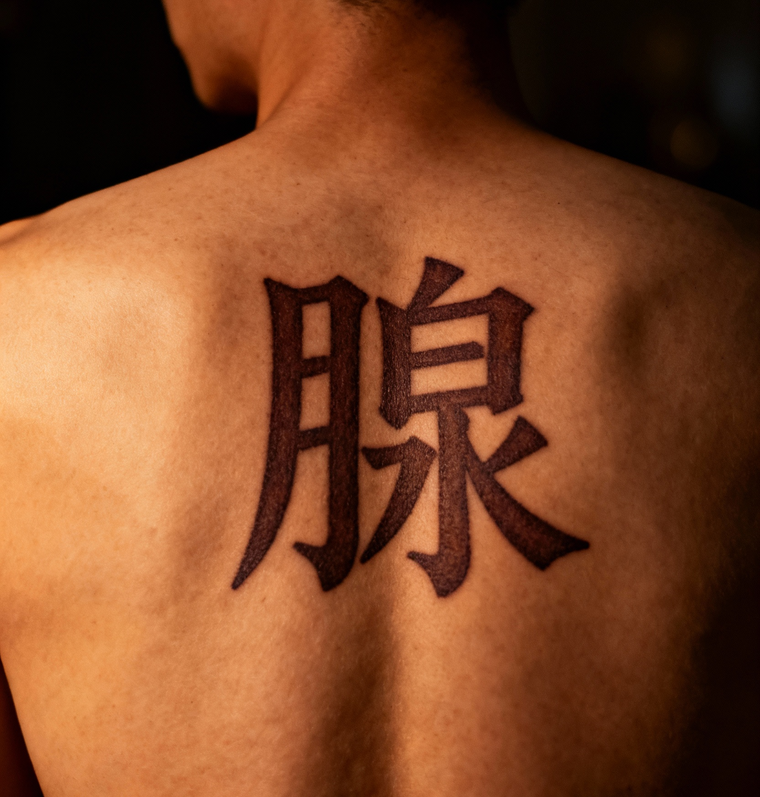
I. The Core Meaning of the Kanji "腺" (sen)
The kanji "腺" is a specific, scientific, and biological term. Its sole meaning is "gland." It refers to an organ or group of cells in the body that secretes substances for specific functions.
1. Literal & Biological Meaning:
Gland:
涙腺 (るいせん, ruisen) - Tear gland.
甲状腺 (こうじょうせん, kōjōsen) - Thyroid gland.
汗腺 (かんせん, kansen) - Sweat gland.
2. Key Distinction:
"腺" is a purely anatomical and physiological term. It does not carry the poetic, philosophical, or emotional symbolism that many other kanji possess. Its meaning is clinical and precise.
II. "腺" as a Tattoo: Meanings and STRONG Warnings
A tattoo of "腺" is an extremely unconventional and generally inadvisable choice. Its meaning is highly specific and lacks the personal or aesthetic resonance typically sought in a tattoo.
Potential Intended Meanings (from the wearer's perspective):
It is very difficult to conceive of a positive or meaningful intent. A misguided attempt might be:
A Medical or Scientific Tribute: A medical professional (e.g., an endocrinologist) might consider it as a symbol of their field, representing a specific gland they specialize in.
A Highly Abstract Personal Metaphor: Someone might try to create a personal metaphor, for example, linking the "涙腺" (tear gland) to their emotions or resilience. However, this meaning would be completely obscure and unintelligible to anyone else.
⚠️ CRITICAL WARNINGS & NEGATIVE INTERPRETATIONS ⚠️
It is strongly recommended to avoid getting a tattoo of the character "腺."
Overwhelmingly Clinical and Impersonal: For native Japanese speakers, a standalone "腺" is puzzling and evokes the feeling of a biology textbook, a medical chart, or a doctor's office. It is not a character associated with personal identity, emotion, or art. It will be perceived as cold, strange, and utterly lacking in aesthetic or spiritual appeal.
Displays a Severe Lack of Cultural Understanding: Choosing this character for a tattoo demonstrates a profound misunderstanding of what makes a kanji suitable for body art. It is the linguistic equivalent of tattooing "GLAND," "ORGAN," or a specific biological term like "ESOPHAGUS" on yourself.
Social and Cultural Confusion: The reaction from those who understand the character will be confusion, followed by amusement or pity. It would be seen as a significant and embarrassing error in judgment.
No Positive or Profound Connotations: Unlike "愛" (love) or "絆" (bond), "腺" carries no inherent positive emotional, spiritual, or intellectual weight for personal expression. Its meaning is purely functional and scientific.
Conclusion and Recommendation
You should absolutely NOT get a tattoo of the character "腺."
It is one of the most ill-advised kanji you could choose. Its associations are impersonal, clinical, and biologically specific.
If you are drawn to a concept related to the body, emotion, or science, here are perfect and powerful alternatives:
To express "emotion" or "feeling," use: 感 (kan - feeling), 情 (jō - emotion), or 心 (kokoro - heart, spirit).
To express "tears" in a poetic sense, use: 涙 (namida - tears).
To express a "connection" to science or healing, use: 命 (inochi - life), 癒 (iyashi - healing), or 医 (i - medicine).
In summary, "腺" is a functionally incorrect and culturally meaningless choice for a tattoo. It will be perceived as a clear and unfortunate mistake. Please choose a character with genuine personal and symbolic resonance to represent your intended meaning.